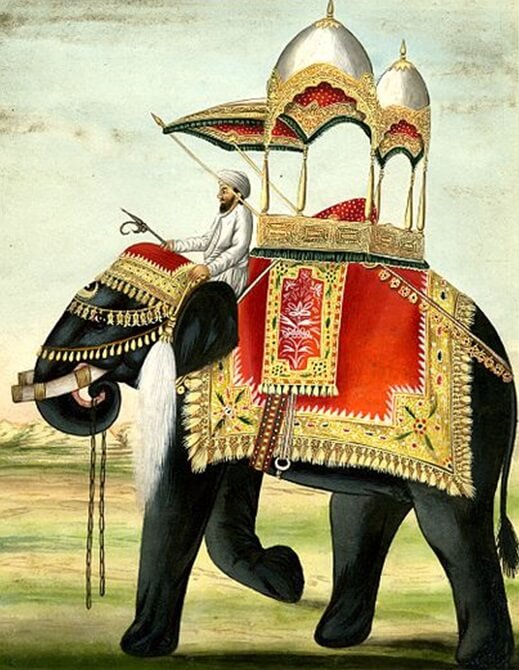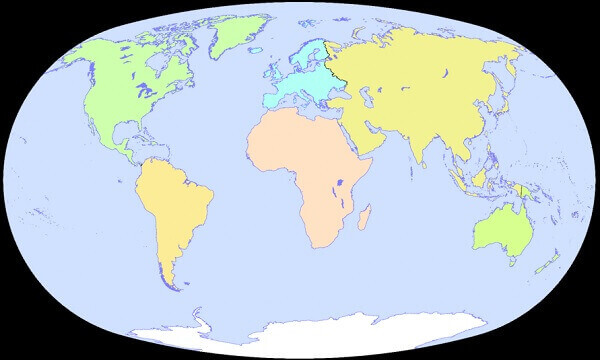Chapter 2: How Kari Saved Our Lives
Performer: Librivox - Adrian Praetzellis
When Kari grew to be five years old, he was almost as high as the ceiling. He was never trained for hunting. We never thought of killing anything except snakes and tigers, and these we killed when they came toward the village and injured men. So Kari never had the training of a hunting elephant. Just the same, he was very alert and steady in the face of danger, so that when it was a question of going into the jungle on the back of an elephant, we generally took Kari with us. During such trips we did not put a cloth of gold on his back or silver bells on his sides. These bells are made in certain parts of India where silversmiths know how to melt and mix silver so that when the clapper strikes the sides of the bell there will be a sound like rushing water. The two bells are tied by a silver chain and slung over the elephant's back, one dangling on each side of him. We never put a howdah on the back of Kari. Very few Hindus put howdahs on elephants.
Do you know what a howdah is? It is a box with high sides inside of which there are chairs for travelers. The howdahs are generally for people who are not accustomed to elephants. They need the high sides so that when the elephant walks they will not fall from his back. They stay in their seats leaning on the edge of the box and see very little, especially children who are not tall enough to see over the sides. That is why Indian children prefer riding bareback on an elephant to taking a howdah.
One evening when my brother and I went out, we put a mattress on Kari's back and tied it very tightly with cords so that it would not slip, for it is not pleasant to slip and fall under an elephant's belly and be stepped on. But Kari was trained so that he would not have stepped on us even if we had slipped under him. We tightened the cords to the mattress, however, and lay down for the night. Though we had bells, we lifted them up and silenced the clappers, so that in walking through the jungle road they would not ring and frighten the animals, for the forest is the dwelling place of silence, and silence being the voice of God, no man dares to disturb it. We lay on the back of Kari and looked up at the stars. In India, the stars are so close that you can almost pluck them with your hands and the velvet blue of the sky is like a river of stillness running between banks of silver.
As we lay there, unable to go to sleep right away, we heard jungle sounds. The heavy tread of the elephant was like clouds brushing the crests of the forest. Once in a while you could see a tiger come out of the jungle, cross a road and disappear in the distance, but Kari was so brave he never condescended to notice the comings and goings of tigers. Once we heard the bark of a fox very near us and then he came out of the jungle. Kari stopped and the fox passed across the road, then we moved on again. In the moonlight which made the road before us look like a river of silver we saw squirrels leaping from branch to branch.
You know, perhaps, that elephants can sleep as they walk. Presently Kari's walk slackened into a slow pace, and we felt quite sure that he was dozing. Then we remembered nothing, for we too fell asleep. I cannot tell how much time passed before we were startled out of our sleep by a terrible roar, a ghastly trumpeting of the elephant and a terrible lunge of his body. We had to hold on to his back very tightly to avoid being thrown off. In a few seconds both of us had turned over — I do not know how — and were lying on our faces, holding on to the cords that held the mattress to Kari's back, while he broke into a run.
Trees bent and broke, branches fell, and we could hear the monkeys stampeding from tree to tree, and flocks of birds, startled out of their sleep, falling upon us, their wings beating our faces. We shouted to Kari to be calm, but he went on as if he were mad. We heard boars snorting, and running away, and strange-looking horned creatures leaping and bounding off in all directions. Then a tree in front of us fell, and the jungle throbbed for a moment. It seemed as though a shiver ran through Kari's body, and he stopped stock still. It was very difficult to tell exactly what had happened until we got off Kari's back. I spoke to him and he shook his head, then I spoke again and urged him to put up his head. He obeyed and I climbed down by his trunk. I felt it was very wet, however, and he shook me off with pain.
My brother spoke to me from above and said when I told him how the trunk felt, "Now I know. You see, this is autumn when bears eat Mohula in the moonlight under the thick shade of the trees. As you know, Mohula intoxicates bears, and makes them sleepy. Some bear had fallen asleep under the trees and Kari, who was also asleep and consequently did not even smell him with his trunk, must have come upon him without suspecting his presence. Although all bears are brought up to respect elephants, this one, no doubt, was so sleepy that he did not know who was upon him and so I am sure he must have sprung up in his surprise and scratched Kari's trunk."
If Kari had been wide awake he would have killed the bear, but being sleepy, the shock and the surprise of the attack and the pain in his trunk frightened him so that he ran out into the jungle mad with terror.
I put my hand on the trunk again. Yes, it was bleeding; I could see in the moonlight that it was not perspiration because my hand was dark red. I spoke to Kari again; this time he did not shake his head so furiously. He was rather willing to listen and I told him I was very sorry about his trunk but could do nothing here, I also told him to go back to the road. He shook his head — that meant "No." Do you know why he did not want to go back to that road? You shall learn at the end of this story.
I got upon his back again. "Since he won't go back to the road," said my brother, "we must give him the master call so that he can make a road through the jungle" and we gave him the master call.
At this Kari lifted his bleeding trunk and smote down the first tree, and then he struck down the next tree. He came upon a third which his trunk could not pull down, so he turned around and walked away from it. After taking a few steps he stopped and slowly walked backwards and with one push of his back, knocked the tree down.
At this we could hear the flocks of birds flying in the air and feel the stamping feet below as herds of animals ran in every direction. We heard the vibrant jabber of monkeys from the treetops, and each time a new tree fell there was more jabbering and more leaping away from tree to tree.
We clung to the elephant's back with our nails and teeth.
Soon we found ourselves on the road, three miles ahead of where Kari had been frightened by the bear.
Do you know why he did not go back to the same spot? Because no animal ever likes to return to the place where he lost his pride. For to be frightened is to lose one's pride.
 Kari the Elephant
Kari the Elephant
Kari the Elephant
Kari the Elephant

 Kari the Elephant
Kari the Elephant
Kari the Elephant
Kari the Elephant



